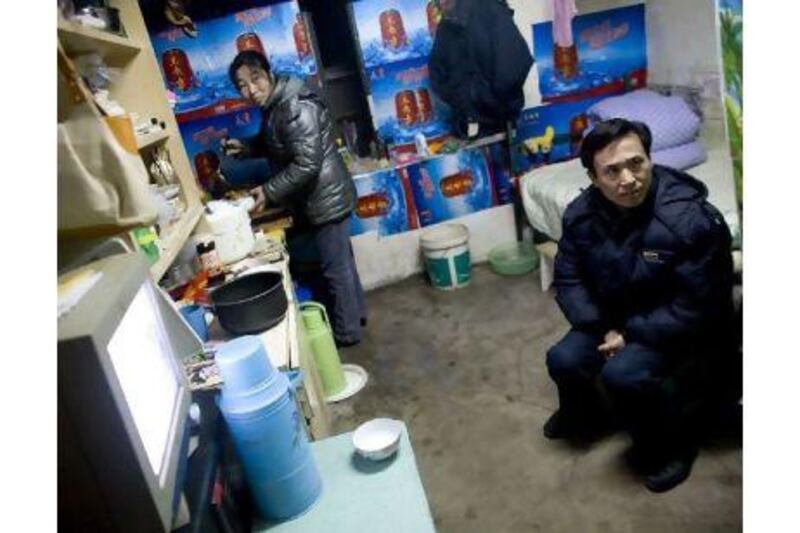BEIJING // A green sign in Chinese and English points to the "air defence basement" and, several flights of stairs below, a long corridor stretches out.
Illuminated at regular intervals by fluorescent lights, this is much more than an air-raid shelter. Off to the sides, each shielded by a thin curtain and a plain door, are more than 30 rooms where some of Beijing's most poorly paid workers live.
This building in the far west of the city is part of a vast subterranean world of low-cost housing, attracting migrants known as "mice" driven underground by sky-high rents.
There are thought to be as many as one million workers in Beijing living in air-raid shelters like these created on the orders of Cold War-era authorities who feared attack.
"I would like to move out, but we don't have enough money for a flat. We cannot afford anything bigger. We just have enough for living and eating," said Yang Xiuyuan, 46, while sitting on his bed wearing a thick coat to keep out the evening chill in his unheated room.
A painter and decorator from Hunan province, Mr Yang shares the windowless room with his unemployed wife, Xiao Genrong, 42, and their daughter, Yang Fang, 24, a saleswoman.
Off to one side, a portable electric hob is used for cooking rice, while in the opposite corner an old-fashioned television set sits next to a computer with a cable connecting it to the internet.
A simple wardrobe with a cloth cover depicting blue skies and palm trees separates the room's two single beds.
"Sometimes it smells like something has gone bad," Mr Yang said. "And we have to go upstairs to wash. That's not good in the winter. It's very cold."
Many of China's 200 million migrants have become "a kind of marginal citizen", said Yung Yau, an assistant professor at the City University of Hong Kong who researches housing policy and safety.
"They're living in basements or slum areas. It happens in China," he said. "They don't have [residence permits] so they can't apply for welfare from the government."
Beijing's mice could find their days are numbered. Just as the authorities have moved to clear out the "ant tribes" of struggling graduates living in basic rooms on the city margins, so they want the mice to abandon their subterranean burrows.
After 58 people died in November when fire engulfed a Shanghai block of flats, officials have reportedly decided underground residences are a safety hazard.
It will be a major upheaval for a housing sector that has existed in the capital for many years. While some basement residences have a makeshift feel to them, with washing hanging in the corridors, others are well ordered and marked with large printed metal signs outside, advertising rooms for rent.
A manager of a nearby basement admitted that the safety hazards were real.
"The firefighters are not able to come down as quickly," said Liu, who gave only his surname. "Most people have to take the risk. If you are a migrant worker and you have just 500 yuan [Dh280] in your pocket, you don't have a choice."
With typical monthly rents of just 300 yuan to 400 yuan per room, basements are affordable even to the lowest paid.
As rampant food price inflation eats into salaries, and with rents seeing close to double-digit percentage point annual increases (a single upstairs room in this outlying district costs at least Dh900 now) some migrants have little hope of living above ground.
Over the long term, improving the lives of migrants depends on better educational opportunities that help them move up the social ladder, Prof Yung said.
"They can then get a higher standard of living, purchase better food and afford something better for their children," he said.
Luo Jianmin, 24, who earns 1,050 yuan a month as a supermarket security guard, moved underground three months ago.
His cut-price rent of 350 yuan allows him to send money back to his parents and younger brother in Yunnan province in the south of China. He admitted his room was "a little bit cold" with no direct sunlight.
A friend paying a visit, Ms Yu, said the secret of keeping warm was not to sit still. "If you do some exercise or some cooking, you don't feel very cold," she said.
While moving about and wearing thick coats keeps the cold at bay, little can be done to improve the air, which is stuffy even by Beijing standards.
Xing Chunyan, 34, who shares a small room with her husband, a shopkeeper, said: "Sometimes you cannot breathe properly because there doesn't seem to be enough oxygen. The air here is not fresh. It's not good for your health." said he and her husband pay 280 yuan a month in rent, plus 10 yuan each for water.
Behind the door hang bags of steamed bread, shrimps and pickles, while on the wall there is a tiny mirror in a blue plastic frame, beside which a toy snowman hangs from a nail.
"Sometimes I feel lonely here, so I go outside to chat with people," she said. "But it's OK living here, even though it's not very big."






